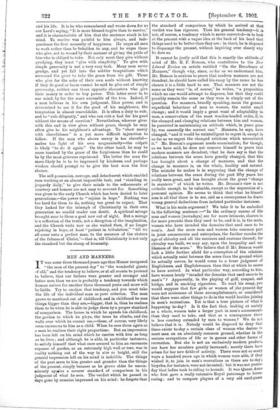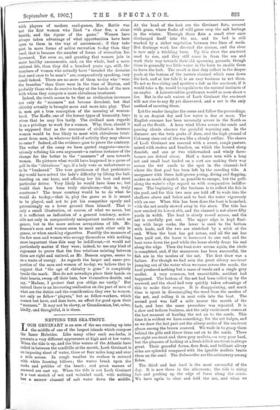MEN AND MANNERS.
IT was some three thousand years ago that Homer compared " the men of the present day " to " the wonderful giants of old," and the tendency to believe, or at all events to pretend to believe, that our fathers were greater and stronger and better men than we are is probably a tendency towards which human nature for another three thousand years and more will be liable. Try to analyse that tendency, and you must take the life of the individual man as your criterion. The man grows to manhood out of childhood, and in childhood he sees things bigger than they are,—bigger, that is, than he realises them to be when he is able to judge them by a proper standard of comparison. The house in which he spends his childhood, the garden in which he plays, the trees he climbs, and the walls over which he cannot see,—these, of course, very likely seem enormous to him as a child. When he sees them again as a man he realises their right proportions. But an impression has been left on his mind which he carries with him as long as he lives ; and although he is able, in particular instances, to satisfy himself that what once seemed to him an enormous expanse of garden, or an extremely high wall or tree, was in reality nothing out of the way in size or height, still the general impression left on his mind is indelible. The things of the past seem to him greater and grander than the things of the present, simply because as he grows older he uncon- sciously apiiies a severer standard of comparison in his judgment of what he sees. The verdict which he passed in days gone by remains impressed on his mind : he forgets that
the standard of comparison by which he arrived at that verdict was less rigorous. Thus his general tendency—it is not, of course, a tendency which is never corrected—is to look at the present with a vague idea at the back of his head that things used to be better than they are ; in short, he is disposed to disparage the present, withoat inquiring over closely why he does so.
It cannot be justly said that this is exactly the attitude of mind of Mr. E. F. Benson, who contributes to the New Liberal Review an article entitled " On the Decadence of Manners," though why, since, so far as we understand him, Mr. Benson is anxious to prove that modern manners are not decadent, he should have called his essay by the name he has chosen it is a little hard to see. That manners are not the same as they were " is, of course," he writes, " a proposition which no one would attempt to disprove, but that they could possibly remain the same as they were is simply out of the question. For manners, broadly speaking, mean the general superficial behaviour of men to women, the social small change; and it would imply a great want of adaptability in man, a conservatism of the most wooden-headed order, if, in the changed and changing relations between him and woman, he persisted in maintaining an attitude which, in years gone by, was assuredly the correct one." Manners, he says, have changed, "and it would be unintelligent to regret it, except in so far as we regret the changed relations which necessitated it." Mr. Benson's argument needs examination; for though, as we have said, he does not concern himself to prove that modern manners are decadent, what he does say is that the relations between the sexes have greatly changed, that this has brought about a change of manners, and that the change in manners is, on the whole, healthy and natural. The mistake he makes is in supposing that the change of relations between the sexes during the past fifty years has really been great, and has brought about the great " change in manners" of which he writes. Mr. Benson's view is not catholic enough to be valuable, except as the expression of a personal opinion. He seems to think that what he himself sees is all that there is to see, and as a consequence he draws wrong general deductions from isolated particular instances.
What is his main argument ? We take it to be embodied in the following sentence In the ordinary course of life men and women [nowadays] are far more intimate, sharers in far more pursuits than they used to be, and it is, in the main, women who have invaded the domains that used once to be man's. And the more men and women take common part in joint amusements and enterprises, the further recedes the age of chivalry and all the manners and customs thereof; for chivalry was built, we may say, upon the inequality and un- likeness of the sexes." We believe that if Mr. Benson would look a little further afield for a conception of the relations which actually exist between the sexes than the ground which he actually covers, he would come to a truer judgment of Englishmen and Englishwomen than that at which he seems to have arrived. In what particular way, according to him, have women lately "invaded the domains that used once to be man's " ? Apparently, in the playing of golf, croquet, and bridge, and in smoking cigarettes. To read his essay, you would suppose that few girls or women of ,the present day were not mistresses of these accomplishments, or considered that there were other things to do in the world besides joining in men's recreations. Yet is that a true picture of what is happening to-day? Is it the fact that, looking at society as a whole, women take a larger part in men's amusements than they used to take, and that as a consequence there is less courtesy extended by men to women ? We do not believe that it is. Nobody would be disposed to deny that there exists to-day a certain class of woman who desires to meet men on an absolutely common ground, whether in the serious occupations of life or in games and other forms of recreation. But she is not an exclusively modern product, nor have her numbers greatly increased ; merely there have arisen for her new fields of activity. There were not so many
ways a hundred years ago in which women were able, if they wished it, to join in men's recreations as there are to-day;
bicycles, for instance, were not invented ; but it was not yester- day that ladies took to riding to hounds. It was Queen Anne who first gave a really extensive Royal patronage to horse- racing ; and to compare players of a very old card-game with players of modern card-games, Mrs. Battle was not the first woman who liked "a clear fire, a clean hearth, and the rigour of the game." Women have always taken advantage of what opportunities have been open to them in the way of amusement ; if they take part in more forms of active recreation to-day than they used, that is because the number of forms of recreation has increased. Yet even so, and granting that women join in more healthy amusements, and, on the whole, lead a more rational life, than they did a hundred years ago, still, the numbers of women who actually have " invaded the domains that used once to be man's " are, comparatively speaking, very small indeed. There are no more of them to-day who " wear the breeches " than there were in the time of Burton, and probably those who do receive to-day at the bands of the men with whom they compete a more chivalrous treatment.
Indeed, the truth seems to be that as civilisation increases not only do " manners " not become decadent, but that chivalry actually is brought more and more into play. That is, men get a true conception of the meaning of woman- hood. The Kaffir, one of the lowest types of humanity, buys wives that be may live lazily. The civilised man regards it as a privilege to work for a woman. Why, then, should it be supposed that as the resources of civilisation increase women would be less likely to meet with chivalrous treat- ment from men, in whatever field of activity they may choose to enter? Indeed, all the evidence goes to prove the contrary. The writer of the essay we have quoted suggests—uncon- sciously refuting his own argument—a curious instance of the change for the better in the " manners " of men towards women. He pictures what would have happened in a game of golf in the "chivalrous" age, if a lady were so unfortunate as to be "bunkered." The true gentleman of that prehistoric day would have solved the lady's difficulty by lifting the ball, kneeling on one knee, and offering her his best and most particular driver. Very likely he would have done so ; but would that have been truly chivalrous,—that is, truly courteous ? The truer courtesy would be to do what he would do to-day,—that is, play the game as it is meant to be played, and not to put his competitor openly and patronisingly on a lower ground than himself. That is only a small illustration, of course, of what we mean, but it is sufficient as indication of a general tendency, notice- able not only in comparatively unimportant matters such as games, but in the more serious occupations of life. Mr. Benson's men and women seem to meet each other only in games, or when smoking cigarettes. Possibly the manners of the few men and women who occupy themselves with nothing more important than this may be indifferent, it would not particularly matter if they were; indeed, to use any kind of argument to prove that the free relations existing between them are right and natural, as Mr. Benson argues, seems to us a waste of energy. As regards the larger and saner pro- portion of the men and women of to-day, we believe that to suggest that "the age of chivalry is gone" is completely beside the mark. Men do not nowadays place their hands on their hearts, sweep off their hats, bow themselves double, and say, "Madam, I protest that you oblige me vastly." But instead there is an increasing realisation on the part of men of what are the duties and the consideration they owe to women, not only as fellow." players," but as fellow-workers, which cannot but have, and does have, an effect for good upon their "manners." It may not be showy, or Grandisonian, but, sober, kindly, and thoughtful, it is there.







































 Previous page
Previous page